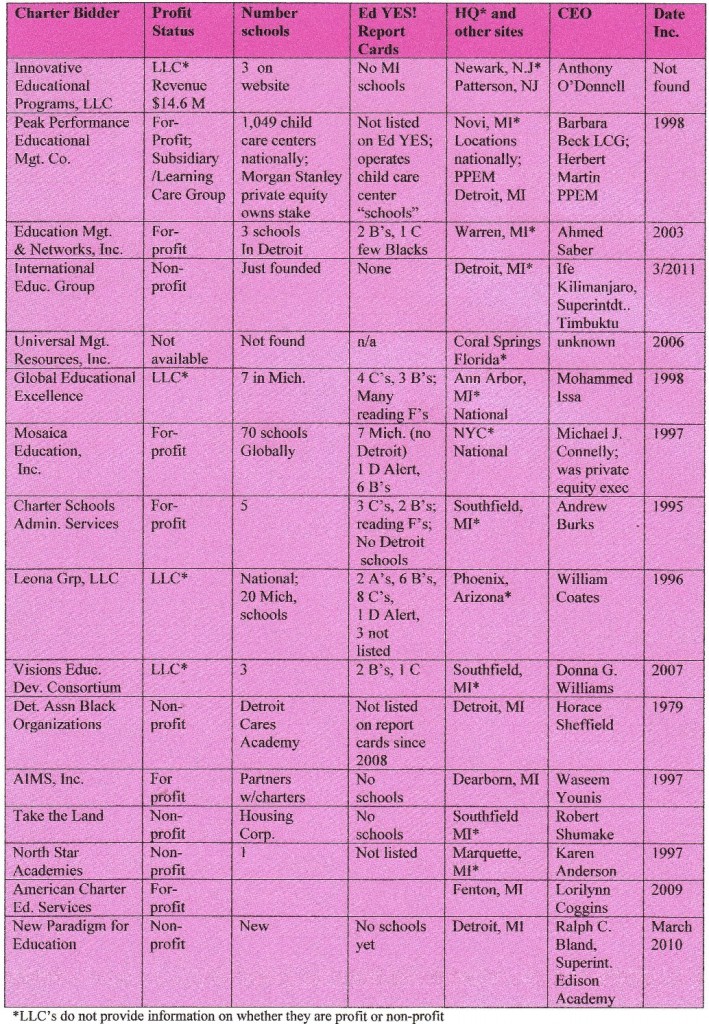By Diane Bukowski
Putting Detroit Public Schools on the charter auction block recalls nothing more clearly than the sale of African children by plantation owners as their families wept. After kidnapped Africans won their freedom, one of the first things they did was establish a system of public schools for all, without regard to race, class, or gender.
In the DPS release announcing that 18 charter organizations had bid on 50 Detroit Public Schools, Robert Bobb said, “We are pleased with the broad experience of many of the organizations that applied and their potential to transform academically-challenged schools . In a number of cases, applicants already run one or more schools that significantly outperform the DPS schools they seek to operate, as measured by the Excellent Schools Detroit report cards.”
The bidders listed have specifically selected DPS schools Jemison, Gardner, Carver, Howe, Davison, White, Loving, Burns, Noble, Nolan, Stewart, Brewer, Detroit City High, Catherine Ferguson, Hancock, Barsamian, MacDowell and Clark, although they are expected to be in the running for a total of 50 schools.
Grades for schools run by charter bidders run mainly in the C overall range, with several showing F’s in reading. Of the 18 DPS schools the bidders specified, however, 8 have B scores, 4 have C scores, and one has a D-Alert on the state’s Ed YES! Scale. For the most part, they outperform schools operated by bidders on the chart below. Many charter schools listed with better grades are not located in poor urban areas.
Four of the charter organizations listed were blasted in a Detroit News article as posted on a website below:
SUBSTANDARD CHARTERS FAIL MICHIGAN STUDENTS
Posted at http://www.susanohanian.org/atrocity_fetch.php?id=1225
By Brad Heath
Detroit News 10/26/03
Six companies responsible for teaching more than 17,000 of Michigan’s charter school students provide an education that falls short even of some of the state’s most troubled inner-city schools.
A Detroit News analysis shows those shortcomings are hidden by minimal scrutiny of how the companies manage more than $123.7 million in tax money each year.
The low-performing companies include three of the biggest for-profit charter school managers in the state, whose students often fall far below minimum standards in reading, writing and math, state education records show. The companies’ schools also spend a smaller share of their budgets in the classroom than others.
While charter schools overall are less likely to meet state standards than traditional schools, Michigan has put thousands of students’ educations in the hands of a few companies that lag behind even faltering districts like Flint and Grand Rapids. Of the 40 companies that run charter schools, six had lower fourth-grade English and math scores than those cities.
Management companies oversee nearly every aspect of 151 of the state’s 200 charter schools, including what is taught and who teaches it, making Michigan one of the nation’s biggest venues for private control of public education.
What’s more, there has been no comprehensive attempt to monitor how the companies perform.

CFA marchers head down Woodward May 10 (photographer was in her car behind the march with a phalanx of other cars; she was later ticketed for blockading traffic because she wouldn't pull over into the marchers)
Instead, oversight rests with more than two dozen universities and school districts that track individual schools. The state Education Department lacks even a full list of which companies run charters in Michigan, let alone a way to measure their success.
“Nobody has asked whether they’re doing a decent job,” said Nancy Van Meter, the director of the American Federation of Teachers’ Center on Privatization. “Nobody has a handle on this, and it’s a question taxpayers in Michigan need to ask: Are you satisfied with this use of your tax dollars?”
State officials say they want more scrutiny of management companies, including performance and financial reviews, but say limited money and staff makes that impossible.
Critics have argued for years that letting companies run public schools — instead of merely supplying textbooks and buses — will hurt students as the companies cut costs to turn a profit. That concern takes on increasing importance as Michigan continues its rancorous debate over whether to raise the cap on the number of schools public universities can charter.
The News found that students attending schools run by the Leona Group, Mosaica Education and Charter School Administration Services have test scores that lag even compared with other charters. Those companies serve more than a quarter of students in Michigan’s charter schools. Three others — Alpha-Omega Education Management, Black Star Education Management and CAN Associates — each manage one school.
School operator fired
In the 10 Michigan schools run by Mosaica Education Inc., for example, only two of every five fourth-graders was able to read as well as the state says they should. And one in five met the state’s minimum standards in writing and math, according to the Michigan Educational Assessment Program tests.
One of those schools, Detroit Advantage Academy on the city’s west side, fired Mosaica last year after board members complained that the company wasn’t making promised improvements, missed reporting deadlines and failed to give school board members timely updates on how tax money was being spent.
“Had they been able to do everything they were required to do in our contract, we wouldn’t have terminated them. That includes educational goals. It includes providing financial reports,” said Karlena Glenn, a Detroiter who serves on the school’s board.
The bottom line was that the board no longer trusted Mosaica to administer public money, she said.
Mosaica contends the board didn’t have the authority to fire it.
Mosaica and other management companies say they take their own measurements of students’ progress, and each claims to be making gains. Companies contend parents who aren’t satisfied would leave. Enrollment waiting lists, they say, are evidence of success.
Gabrielle Garner of Southfield enrolled her daughter in Charter School Administration Services’ Southfield Academy this year, in part because she liked how closely it resembles a private school, with students required to wear uniforms. Students at the school have lower test scores than Southfield’s traditional public schools.
More important than who runs the school, she said, is that her daughter is happier and seems to be getting a better education than she was in an Oak Park public school last year.
“What’s important are the results we get,” she said. “Everyone here is working parents, and we just want the best for our kids.”
Explanation falls short
One classroom at the Voyageur Academy, a for-profit charter school in Detroit run by the Leona Group, bubbles with fourth-grade voices speaking Spanish. The school is small, with about 330 students. Parents get report cards every week. Principal Roderick Atkins knows his students by name.
Still, students at Voyageur lag behind the Detroit Public Schools on elementary school exams. Last year, 39 percent of fourth-graders read as well as the state said they should, compared with 55 percent in Detroit Public Schools.
Voyageur was warned by the state this year that those scores didn’t show enough progress.
“It wasn’t good. We’re still trying to figure out what happened,” said Atkins, who left a marketing job with General Motors Corp. to run the school. Test scores for Voyageur’s seventh- and eighth-graders, taught in a different school, exceeded public school averages.
Across Leona’s schools, 39 percent of children met the state’s minimum standards in reading, compared with the state average of 75 percent. Smaller percentages passed tests in writing and math.
Those results are explained, in part, because Leona tends to draw more students from low-income homes, said Michael Malone, the company’s executive vice president for Midwest schools. “We feel good about where we are, feel good about how we got here and feel excellent about the next phase of where we’re going,” he said.
The Detroit News measured management companies using results of the MEAP tests and financial records the schools supplied to the state. Because Michigan has no accurate list pairing management companies with schools, the News surveyed charter schools statewide.
The trends persist even after accounting for how many students at each school live in poverty, a factor studies show is often critical in whether children succeed in school.
The analysis found broad gaps between management companies. For example, National Heritage Academies’ schools, centered mainly in western Michigan, had marks among the best of the state’s charter schools. It is impossible to say conclusively whether charters outperform traditional public schools because changes to state tests and limited data make it difficult to track students over time.
Other studies on management companies have reached mixed conclusions. Some say for-profits don’t improve education; one study published last week by the Brookings Institution found charters run by management companies nationwide show bigger improvements than other charters.
Value inconclusive
Questions about the use of private companies in public education began more than a decade ago, when some public schools turned to management companies to improve foundering public schools in cities such as Inkster and Mount Clemens. But it was charter schools that ignited the industry’s explosive growth — and the surrounding debate.
Ten years after Michigan first allowed charter schools, there’s been little attempt to determine whether private control has bought a better education for children. And there’s been no overarching review by the state or by the universities that chartered most of the schools.
“The big concern is that after 10 years, we still can’t answer that question,” said Gary Miron, a Western Michigan University education researcher.
Schools hire managers to cover startup costs such as leasing buildings and buying computers and because they make it simpler to handle everything from payroll to complicated education laws. No two companies are exactly alike, but most hire the teachers and administrators and run the school for a flat fee.
Privately run charters managed by about 40 companies spent more than $370 million in public money last year. Most of the companies contract with only one or two schools.
Making sure they do a good job is up to each charter’s board of directors, according to officials at universities that authorize charter schools. They contend their job is to look only at whether the schools themselves are successful, not how well a private contractor performs in general.
“Our contract is between the university and the charter board,” said Jim Goener, the head of Central Michigan University’s charter schools office, the state’s biggest authorizer. “We tell the boards how the school is performing. They need to draw their own conclusions about why the school is performing that way and act accordingly.”
CMU has its own guidelines to ensure boards are sufficiently independent, but not all of the state’s charter authorizers have similar policies.
The state auditor general last year reported many boards are tied too closely to their management companies — including cases where companies nominated their own board members and where companies actually own the school building, making it virtually impossible for the board to replace a company that’s failing to deliver a good education.
Generally set up as privately held corporations, the companies are not required to say how much profit they make running schools. They operate on the promise that they can deliver a better education than other public schools and have enough money left over to be profitable.
Accountability issues
State education officials say they want closer scrutiny of management companies’ contracts, lease agreements, spending and test scores. The auditor general’s report recommended a stronger role for the state, as did a report by a panel appointed by the Legislature in 2001 to study charter schools in Michigan.
That expanded oversight was part of a compromise agreement to allow more charter schools between lawmakers and Gov. Jennifer Granholm that collapsed earlier this year.
“Our oversight isn’t as good as I would like it to be,” said state Superintendent of Public Instruction Thomas D. Watkins.
Charter school proponents disagree. “We have the acid test of accountability, and that’s ‘where do parents send their children?'” said Joseph Lehman, executive vice president of the Mackinac Center for Public Policy. “If a company isn’t doing a good job, parents will leave.”
That’s not enough for Ann Rock of Livonia.
When her daughter enrolled in National Heritage’s Canton Charter Academy in Canton Township, she said the company promised a back-to-basics emphasis on history, science and math. Every day. So when the middle school switched to block scheduling this year, with longer classes every other day, she was outraged. But she didn’t know where to turn.
“I came in because of what they promised,” Rock said. “You can’t just pick up your kid and leave in the middle of the year. So who’s holding them to their promise?”
THE LEONA GROUP
Phoenix, Ariz.-based Leona runs a variety of schools, almost all of them in urban centers. Its test scores are lower than most management companies’ and city averages. One of its schools was forced to close this year amid complaints the board was paying a church rent that was three times above market rates.
Enrollment: 6,300
School expenditures: $46 million
Instructional spending per student: $3,811 (46 percent of total expenditures)
CHARTER SCHOOLS ADMINISTRATION SERVICES
The Southfield company’s schools are mainly in the suburbs, though they serve many Detroit students. Its test scores are lower than those of most other management companies.
Headquarters: Southfield
Enrollment: 5,600
School expenditures: $39 million
Instructional spending per student: $2,685 (39 percent of total expenditures)
MOSAICA EDUCATION
Mosaica’s schools are scattered across the state, from Detroit to Flint and Benton Harbor, and have lower test scores than other management companies do. Based in New York, it uses a proprietary Paragon curriculum that emphasizes social science, literature, history and philosophy.
Enrollment: 4,274
School expenditures: $31 million
Instructional spending per student: $3,683 (42 percent of total expenditures)
Sources: Arizona State University, Michigan Department of Education, Michigan Department of Treasury, Detroit News research

















I work in a charter school in Detroit that is well outperforming neighboring DPS schools. For example, DPS Cass Technical High School ranked 2nd this 2011 in test scores… still another Leona charter took third place. From my perspective… the charters are right on the heels of DPS and they are making big waves. The charters are tenacious and built with staff that is as equally. We are not selling slaves at an auction block. In fact, race has nothing to do with it.
That image (the one that is bleeding over the top of your article) never came into my mind although we cannot erase the damage done by white flight. In fact, my school is 92% hispanic and in the city of Detroit… so what does that mean? Are we selling Hispanic children down the river as well? I’m white. So when I teach black children in a charter am I STEALING THEIR FREE WILL?
This is the thinking that has to STOP! No matter how well crafted and researched your article… the first thing it does is stir up racial tension and thoughts and aim throw away the entire message.
It is sad to see this post as the rebuttal… this post as your “well-crafted” response. It is littered with inaccuracies and a slanted viewpoint.
DPS is failing.
Charters are winning and outperforming… with less overall resources.
Bottom line… charters are producing smarter children.
If both options were free (and are)… where would you want to send your child to school?